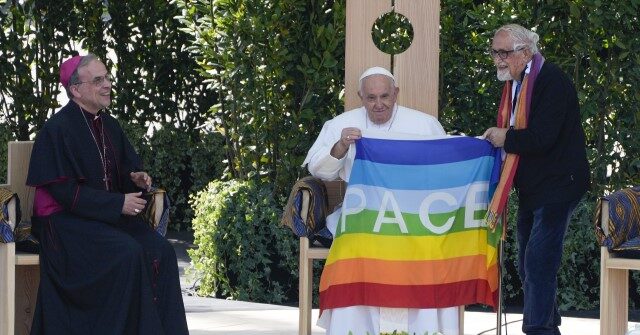In a significant meeting at the Vatican, Pope Francis engaged with a group of LGBTQ+ Catholics, including intersex and transgender individuals, to discuss the Church’s stance on gender-affirming care, which encompasses procedures like sex change surgery. This nearly 90-minute encounter, facilitated by Sister Jeannine Gramick—a U.S. nun previously sanctioned by the Vatican—underscores the continuing dialogue around LGBTQ+ issues within the Catholic Church. Sister Gramick founded New Ways Ministry, an organization aimed at supporting LGBTQ+ Catholics, despite the Vatican’s 1999 condemnation of her pastoral methods and the perceived inconsistencies with Church doctrine on homosexuality.
Sister Gramick, along with Father Robert Nugent, faced restrictions from participating in pastoral activities involving homosexual persons due to their advocacy for LGBTQ+ rights, which the Vatican deemed doctrinally unacceptable. The Congregation for the Doctrine of the Faith criticized both individuals for not adhering to the Church’s traditional views, thereby reinforcing the importance of conformity to established teachings regarding sexuality and morality. This historical backdrop casts a longer shadow over the recent meeting, highlighting the ongoing tensions between progressive advocacy and conservative adherence to Church dogma.
During the recent meeting, the LGBTQ+ group expressed a desire for Pope Francis to evolve the Church’s restrictive view on gender-diverse individuals and advocated for a more compassionate engagement with their lived experiences. This call for change reflects a broader trend within certain segments of the Church to foster inclusivity and understanding, challenging long-standing doctrines that many perceive as outdated or harmful. The meeting’s participants, including a doctor who specializes in gender transition care, sought to present firsthand narratives to Pope Francis, emphasizing the necessity for the Church to acknowledge the experiences of LGBTQ+ communities.
Sister Gramick articulated gratitude for the opportunity to share the stories of intersex and transgender individuals, highlighting the importance of listening as a tool for developing a more authentic and compassionate pastoral approach. She believes that hearing these stories can inspire the Church to reconsider its historical teaching and practices surrounding LGBTQ+ issues and align more closely with compassion and respect for human dignity. This sentiment resonates with Pope Francis’s prior assertions that the Church should be a place of welcome, although the degree to which such openness will manifest institutionally remains uncertain.
Despite these advances in dialogue, the Vatican’s historical stance against organizations like New Ways Ministry has not changed fundamentally. The U.S. bishops have consistently rejected New Ways Ministry’s claim to operate under a “Catholic” identity, asserting that their teachings are misaligned with authentic Church doctrine. Cardinal Francis George’s previous statements reinforce this position, emphasizing the perceived need to safeguard Church teachings from what he characterized as misleading interpretations or practices. This ongoing tension highlights the ideological divide within the Church regarding issues of sexuality and gender identity.
As the Catholic Church navigates these challenging conversations, the meeting with LGBTQ+ Catholics represents a critical juncture, but it also reveals the complexity of reconciling traditional doctrines with modern understandings of gender and sexuality. While there is hope for a more inclusive approach under Pope Francis’s leadership, the institutional resistance to change remains potent, complicating the potential for a significant shift in Church teachings. The dialogue initiated during this meeting may serve as a catalyst for further discussions, but the path toward a more inclusive Church faces formidable obstacles rooted in its foundational teachings on morality and human sexuality.

